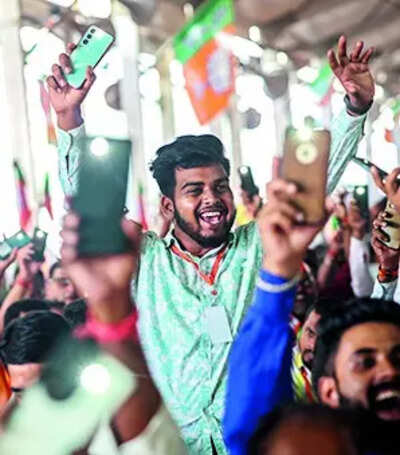Among the late-night arrivals is Manish Kumar, 45, who has just got off the LTT Rajgir Express from Mumbai. He strikes a deal with an auto driver to travel home, around 40km across the Ganges. “Bihar has changed. It is no longer the old Bihar,” he says smiling.
Two decades ago, such a scene would have been unthinkable. Once darkness fell, Patna Junction became a place of fear. Travellers locked themselves in waiting rooms or lay sleepless on station floors rather than risk stepping outside into the so-called “jungle raj”.For nearly 30 years, Bihar’s politics has been haunted by that phrase. Coined during the 1990-2005 tenure of Lalu Prasad and wife Rabri Devi, “jungle raj” became a shorthand for kidnappings, extortion and the breakdown of law and order. The opposition wielded the phrase relentlessly – a warning of chaos that might return if RJD regained power.Now, as Bihar moves towards its election, “jungle raj” is again echoing in speeches – though with diminished force. On Oct 23, PM Modi revived the phrase, saying “people will not forget jungle raj in Bihar for another 100 years…” The comments coincided with RJD mascot Tejashwi Prasad’s formal declaration as Grand Alliance’s CM candidate. The two-phase polling – a first in decades – has itself become a talking point. Union home minister Amit Shah recently argued that the shorter schedule, compared with the six phases held in earlier years, was proof that law and order had improved.But this time, the old narrative may no longer strike fear – especially among 1.6 crore voters between 18 and 29 years who never lived through the years of “jungle raj”. “After governing Bihar for 20 years, JDU and BJP are still contesting on the jungle raj narrative. It shows they don’t have much work to speak about. Yes, law and order have improved, but crimes still happen every day,” said Mohammad Jilani, 28, an auto driver at Patna airport.”If NDA keeps talking about jungle raj, it will sound like they are looking backward rather than forward,” said Anurag Kumar, a first-time voter from Patna. Tanvir Aeijaz, associate professor at Ramjas College, said the “politics of fear” is waning as memories fade and aspirations rise.




